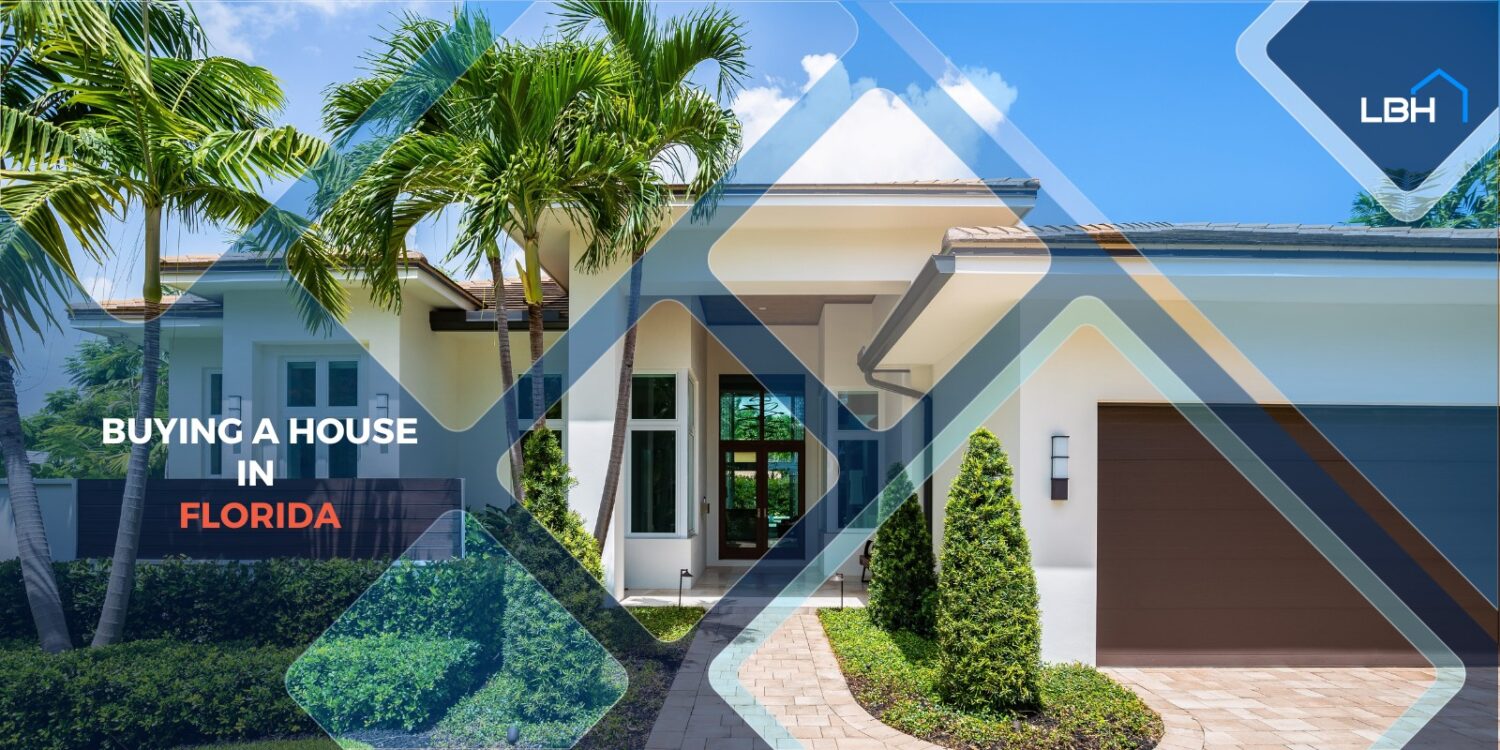Are you thinking of buying a house in Florida? You’ll be glad to know that the real estate market here is thriving. According to the U.S. Census Bureau, Florida has consistently outperformed all other states in terms of net migration — the number of individuals choosing to relocate there versus those moving out. The influx has resulted in intense buyer competition.
With many people looking to relocate to Florida, it’s only wise for home buyers to arm themselves with the knowledge required to beat the competition and make a successful purchase.
This comprehensive guide will explore the current state of the Florida real estate market and provide valuable insights into the process of buying a home in Florida.
Florida Real Estate Market Trends
The Florida real estate market has been on a tear recently. According to Zillow, October’s median home price was $392,904. This was up 1.1% from October 2022. However, home prices in Florida have slightly declined since June 2023.
Florida’s appeal to retirees due to its relatively low cost of living and warm weather is a major factor driving the demand for housing. The Sunshine State also attracts individuals in their prime working years due to its accommodating job market, no income tax policy, and access to the beach.
Mortgage rates and home insurance have skyrocketed in recent months, making homeownership an expensive venture. Speculative behaviors by investors have also been driving up prices to unsustainable levels. This has led to fears of a housing bubble. Combine this with the most recent trend of declining mortgage rates, and you’ll have many home buyers wondering if the Florida housing market is due for a crash.
As a testament to the purported overheating, Florida home sales fell by 5.8% year-over-year. 28,595 homes were sold in October 2023, compared to 30,373 in October 2022.
The median days on the market rose significantly. In October 2023, the average Florida home took 44 days to sell, four more days than last year. Inventory and the number of newly listed homes also rose by 7.4% and 16.3%, respectively, over the past year.
But let’s not jump to conclusions just yet. The Florida housing market is known for its ups and downs and may bounce back in the long run. Market forecast predicts an 11.53% rise in home prices in the next five years.
How to Buy a House in Florida
Florida is expansive, covering over 65,000 square miles. Before setting out to buy a house, you will need to have a good idea of where you want to live or the features you would like in your neighborhood.
Ask yourself if you want to live near the Atlantic Ocean or the Gulf of Mexico. You also have the option of inland locations, away from the vibrant coastal areas. You can also choose between the cosmopolitan energy of cities like Miami or a laid-back suburb with a retirement-style vibe. Whatever your preference, Florida has a place perfect for you.
While focusing on the ambiance of the neighborhoods, remember to consider the cost of living. Housing is the major expense, but others like transportation, healthcare, and monthly expenses should also be considered. Note that the cost of living varies significantly across the state. For example, living expenses in Miami are 13.8% higher than in Tampa.
Prominent Places to Buy a House in Florida
Florida is home to 411 municipalities distributed across 67 counties. Of these, 267 are cities, 123 are towns, and 21 villages. Most have a distinct real estate scene, favoring different budgets, lifestyles, and housing options. While choosing the best place to buy a property in Florida is usually a personal decision, homebuyers generally prefer certain locations. These include:
Tampa-St. Petersburg-Clearwater Metropolitan Area
This area has garnered significant attention from young adults and families. It’s best known for its pristine beaches on the Gulf of Mexico. Sports enthusiasts and history lovers will also be spoiled for choice, thanks to the presence of several major sports teams and museums.
According to Forbes, its economy is strong, with a median income of $59,893. The median home price is $437,000, and the quality of life rating stands at 6.8/10.
The Greater Miami Area
Miami is a melting pot of cultures and diversity, making it an excellent place to buy a house in Florida. It’s known for its electrifying nightlife, pristine beaches, and art scene.
The area has also recently seen an influx of tech companies. This has made it attractive for young professionals looking to advance their careers. The median home price in Miami is $617,000. The median income is $57,815, and quality of life is rated at 6.2/10.
Cape Coral
Located in Lee County, Cape Coral has plenty of waterfront properties and easy access to the Gulf of Mexico. This makes it a prime location for water activities. The median home value in Cape Coral is $479,000, with a median income of $61,780. Its community well-being score is 56%.
Jacksonville
Although the most populous Florida city, Jacksonville has a high quality of life, averaging 6.8/10. It offers big city conveniences and the chance to live near the Atlantic Ocean but with affordable living costs.
The median home price is $429,000. Jacksonville’s median income is $54,269, and its unemployment rate is 2.8%. Its community well-being score is also impressive at 61%.
Pensacola
White sand beaches with breathtaking sunsets and emerald-green waters are usually the main draws of Pensacola. The local economy is thriving, with a median income of $59,199. It has a community well-being score of 55/100 and a quality of life rating of 6.5/10.
Best Neighborhoods for Families in Florida
Despite being famed for its vibrant lifestyle and as a retirement destination, Florida still has plenty of family-friendly neighborhoods. The most common are Gainesville, Sarasota, Tampa, Tallahassee, and Orlando. These areas have been applauded for their excellent schools, low crime rates, affordability, and high overall quality of life.
Financing Your Home Purchase
Like other states, financing is one of the most critical requirements to buy a house in Florida. This state has several types of mortgages. Conventional loans are among the most common and are offered by private lenders.
These usually vary in amortization periods and interest rates. They include fixed and adjustable-rate mortgages as well as jumbo loans. These loans are often characterized by higher credit scores and down payment requirements.
Government-backed loans are also available in Florida. These include FHA loans and VA loans. The former is particularly popular among first-time homebuyers, while the latter is reserved for qualifying veterans and active-duty military members. Both normally have lower credit scores and down payment requirements than conventional loans.
How to Qualify for a Mortgage in Florida
You will need a stable income to qualify for a mortgage in this state. Lenders will also use your credit score and debt-to-income (DTI) to determine the risk involved. A down payment will be required, except for VA loans. A credit score of 620 or above and a DTI below 43% are usually recommended.
Conventional loans often require a down payment of at least 20%. Some lenders may accept as little as 3% down with insurance. Government-backed loans normally have lower down payment requirements. FHA loans require a minimum of 3.5%, while USDA and VA loans don’t require any down payment.
Getting Pre-Approved for a Mortgage in Florida
Getting pre-approved for a mortgage in Florida involves submitting an application. The lender will review your financial status and determine how much they would be willing to lend you. Pre-approval enables you to budget accordingly. It can also strengthen your negotiating position.
Making a Competitive Offer on a House in Florida
When making an offer, it’s essential to price it accordingly. Analysis of the current market conditions and the house condition can help with this. A knowledgeable real estate agent can also provide comparable sales data to guide you on pricing.
Also, show the seller you’re serious by putting down a substantial earnest money deposit. You should also avoid including unnecessary contingencies in your offer. But in your bid to make the offer appealing, don’t forget to protect your interests. Conduct a thorough home inspection and make sure you include contingencies for repairs or renegotiations.
Financing and appraisal contingencies are also paramount. The former grants you the right to withdraw the offer without penalties should you fail to secure a mortgage. The latter enables you to walk away if the house is appraised for less than the purchase price.
Closing on a House
On the day of closing, all parties involved in the transaction meet to finalize the deal. The buyer will review and sign all relevant documents, provide payment for the closing costs and down payment, and receive the keys to their new home. The title is also transferred from the seller to the buyer, marking the official sale of the house.
Closing involves certain additional costs. These include origination fees that the lender charges. Third-party fees for services such as title search and insurance, home inspection, and appraisal also add to closing costs. Generally, these costs range from 3-6% of the home purchase price.
Tips for Buying a House in Florida
It’s easy to make a mistake when buying a house in Florida. But with meticulous planning, you can avoid them.
Below are the biggest mistakes to avoid when buying a home in Florida:
- Overlooking the importance of a real estate agent
- Failing to get pre-approved for a mortgage
- Bypassing the home inspection
- Not accounting for closing costs
- Ignoring market trends
- Not factoring in homeowners’ insurance
Finding the Best House Deals in Florida
Here are some ways to land a great deal on a house in Florida:
- Look for properties in up-and-coming neighborhoods.
- Consider foreclosed homes.
- Attend open houses.
- Use repairs and renegotiation contingencies.
- Work with an experienced Florida real estate agent.
- Time your purchase by taking advantage of seasonal and market fluctuations.
Other Considerations When Buying a House in Florida
In addition to the above, there are a few other factors to consider when buying a house in Florida. These include:
- Florida’s property taxes that amount to 0.91% of the home’s value
- Weather and natural disaster risks in the area
- The cost of flood insurance
- The absence of dual agency, meaning the agent can’t represent the buyer and seller in the same transaction
- Take advantage of the mandatory seller’s disclosure to learn more about the property and its history
- The property’s future resale value
Take Advantage of the Florida Real Estate Market
Florida’s real estate market has always been a hallmark of vibrancy. Even with the ongoing concerns of a crash, prices remain steady, with reliable forecasts projecting continued growth.
Aspiring homeowners should take this as a sign to swoop in and take advantage by buying a Florida property at a relatively lower price. But of most importance is diligence in the process of buying a home in Florida, starting with enlisting an agent and studying market trends.












